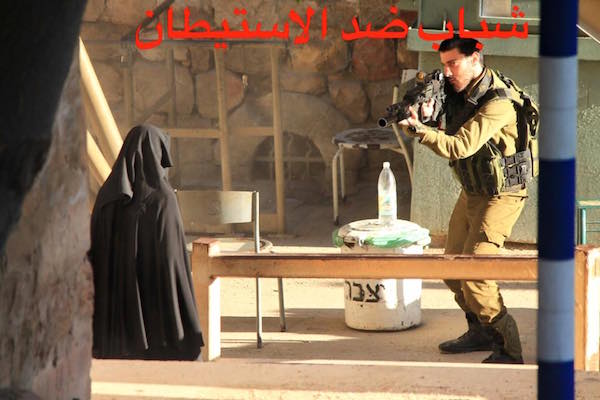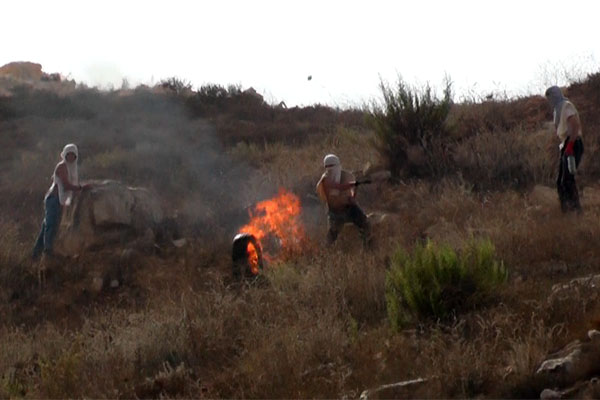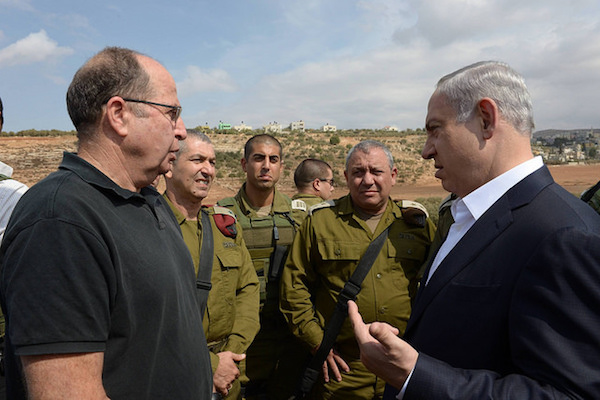We’ve been trained to think that if there’s no blood then it’s not worth talking about, that it’s not ‘terrorism.’ But terror is also ridiculing the corpse of a religious woman, it is regular settler attacks against Palestinian villages, and it being attacked just for speaking Arabic.

As we are inundated by reports of deaths across the West Bank, Jerusalem and Hebron, I’ve starting compiling my own list of stories that will never make it to the headlines in the Israeli media — incidents in which not enough blood was spilled. The ISIS effect, according to which a story is only worth reporting once blood has been let, has officially reached the Israeli landscape.
Take for example the distribution of photos of Hadeel al-Hashlamon by right-wing Israeli activists. The corpse of a 19-year-old religious Palestinian woman has become the subject of ridicule and cruelty online. The young woman who insisted on modestly covering her body is stripped naked for all to see. Someone writes: “With such a hair body, it’s good thing she was murdered,” “I suggest all terrorists wear normal underwear before an attack because we photograph everything.”
The comment that really hurt me, as a woman, came from a women’s rights activist who tried to stop the flock of men picking at Hadeel’s dead body: “Jewish teenage women can also read your comments about the young woman’s hairy body. Think about what this does to their self-image!”
I must ask: aren’t these the same men who raped a young woman in a parking lot or took advantage of women on the Internet? Aren’t these the same strong, chauvinistic, violent Jewish men who filmed a young, drunk woman having sex on top of a bar in Tel Aviv?
When young Jewish women are exposed to men looking at the naked body of a dead woman (Arab or Jewish), it isn’t only their self-image that is affected. They lose their very humanity, their respect as women, and their conscience. Just imagine Palestinians distributing a naked photo of Na’ama Henkin with four Arab men standing above her.
The banality of terror

The second story comes from a small village near Ramallah, and it is about a woman raising five boys who makes Palestinian embroidery to support herself. She describes how a group of armed settlers lie in the wait for Palestinian vehicles traveling between villages. One cannot do anything to stop them; they are fully armed and are always shooting, simply for the sake of scaring Palestinians.
Yesterday they fired at the woman’s brother-in-law who had been transporting goods, beat him, and fled. No one reports or speaks about it. The Palestinian villages live under a constant threat that a group of armed settlers will enter the village, destroy, pillage, and murder. There is no Palestinian or Israeli police presence, and the army has put most of the villages under closure. There is no redemption. She describes how her children sleep in the same room with her and are afraid of leaving the house.
According to the definitions I am aware of, this is terrorism. There is no other word such acts. Some of the villages have organized local initiatives to protect young Palestinians, including WhatsApp groups, without clashing with the army or the settlers — who have their own open-fire rules. The local initiatives in the villages coordinate with the Palestinian Authority, which brings up questions of who is truly the sovereign on the ground. I assume that it is only a matter of days until we hear about a young Palestinian “terrorist” who tries to stab a settler near the wall in Bil’in or Kafr Na’ama in western Ramallah, and is shot to death, of course.
In a different village, a woman describes another form of terror: cutting down olive trees in the village. Everyone is wary of the upcoming olive harvest season, with clashes likely to be crueler than ever. Palestinians are worried about the loss of their livelihood. No one is speaking about their livelihood. I am reminded of the thousands of Palestinians who leave home at 2 a.m. in order to search for work anywhere they can. They are humiliated, exhausted, and carry the burden of the occupation on their shoulders, not to mention the even greater responsibility of putting bread on the table.
What will happen in this right-wing government’s war to all the poor families who make their living from the land or as day laborers? Who will pay the price for the occupation this time?
Socks and chocolate

And from there to another front in the current situation, Jerusalem. The social networks are being flooded with photos and images from both the Israeli and Palestinian sides, of clashes everywhere and and leadership nowhere. Netanyahu’s right-wing government is bloodthirsty, and the Abbas government is on its death bed, asking for international protection for holy sites and Palestinian lives.
After a few dozen people are killed Netanyahu and Abbas will begin courting each other once again, but too late of course. The Israeli voices that I hear on the street and read on social networks bring on a sense of déjà vu from last summer: “Let the IDF win”; “The nation of Israel will defeat our enemies”: “Let the IDF slaughter cut them down.”
Last summer there was a donation drive to give clean socks to Israeli soldiers fighting in Gaza. I just got an invitation on Facebook to donate socks to police protecting Jerusalem. It turns out that these heroes going god’s work have a shortage of chocolate bars and socks. Whoever organized the donation drive is planning an intense winter, so we better envelop the cops with love and warmth, and socks! It’s time, once again, for women to step into their traditional role of providing comfort and compassion in times of war.
What is there left to say? The word “pathetic” feels most appropriate in the current situation. Why does the Jewish nation need war in order to feel camaraderie? Why must there be a gentile enemy in order to feel that “we’re being persecuted together?”
An entire army of psychologists must be raised for the “let sanity reign” campaign. When will you all wake up and choose leaders who don’t believe you can subsist on persecution, fear and victimhood alone, and all in the name of the bible and god, who, by the way, is also sick and tired of this?
‘I’m an Arab, don’t you see?’
And finally, something personal and difficult. My son and some of his friends went to treat themselves to a celebratory meal at a restaurant in central Israel this week. Four young boys, aged 18-22, speaking Arabic around a table. The waiters and cooks were also Arab, of course. Five larger, slightly older Jewish men walked into the restaurant, noticed their “Arabness” and began teasing my son and his friends. When they were treated to the cold shoulder, they went straight to punches. Every one of the youngsters was hit, hard, and my son understood for the first time what it feels like to have a chair thrown at his head.
Beaten and humiliated, they left and went to a medical clinic. Thank god that it ended only with a few stitches on the forehead and a few bruises here and there. After we processed the bad news and I swallowed the bitter pill of my son’s trampled dignity, I tried to convince him to file a complaint with the police. “Surely everything was caught on camera and there are witnesses,” I told him. He responded: “Mom, when will you understand where it is that you live? Who’s going to nab them and put them on trial? I’m an Arab, get it?”
This article first appeared in Hebrew on Local Call. Read it here.

